Booker T. Washington
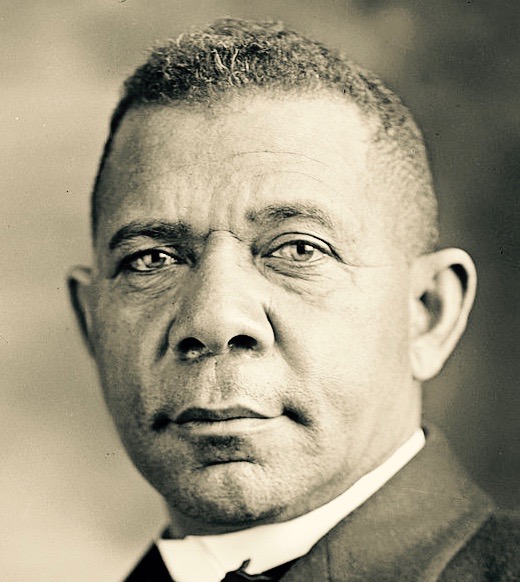
Booker T. Washington
In 1881, Booker T. Washington founded the Tuskegee Institute in Alabama, which focused on training African Americans in agricultural pursuits. A political adviser and writer, Washington clashed with intellectual W.E.B. Du Bois.
Booker T. Washington – Black Educator and Founder of the Tuskegee Institute by Patricia Daniels, Contributing
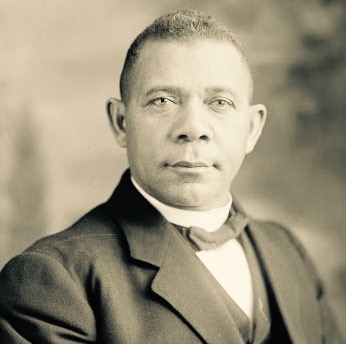
Booker T. Washington
Seated studio portrait of American educator, economist and industrialist Booker T. Washington (1856-1915), founder of the Tuskegee Institute in Alabama, early twentieth century. (Photo by Harris & Ewing/Interim Archives/Getty Images)
Who Was Booker T. Washington?
Booker T. Washington is best known as a prominent black educator and racial leader of the late 19th and early 20th centuries. He founded Tuskegee Institute in Alabama in 1881 and oversaw its growth into a well-respected black university.
Born into slavery, Washington rose to a position of power and influence among both blacks and whites. Although he earned the respect of many for his role in promoting education for blacks, Washington has also been criticized for being too accommodating to whites and too complacent on the issue of equal rights.
Dates: born April 5, 1856 – died November 14, 1915
Also Known As: Booker Taliaferro Washington; “The Great Accommodator”
Famous Quote: “No race can prosper till [sic] it learns that there is as much dignity in tilling a field as in writing a poem.”
Early Childhood
Booker T. Washington was born in April 1856 on a small farm in Hale’s Ford, Virginia. He was given the middle name “Taliaferro,” but no last name.
His mother, Jane, was a slave and worked as the plantation cook. Based upon Booker’s medium complexion and light gray eyes, historians have assumed that his father — whom he never knew — was a white man, possibly from a neighboring plantation. Booker had an older brother, John, also fathered by a white man.
Jane and her sons occupied a tiny one-room cabin with a dirt floor. Their dreary home lacked proper windows and had no beds for its occupants. Booker’s family rarely had enough to eat and sometimes resorted to theft to supplement their meager provisions.
When Booker was about four years old, he was given small chores to do on the plantation. As he grew taller and stronger, his workload increased accordingly.
Around 1860, Jane married Washington Ferguson, a slave from a nearby plantation. Booker later took the first name of his stepfather as his own last name.
During the Civil War, the slaves on Booker’s plantation, like many slaves in the South, continued to work for the owner even after the issuance of Lincoln’s Emancipation Proclamation in 1863. By the end of the war, however, Booker T. Washington and his family were ready for a new opportunity.
In 1865, after the war ended, they moved to Malden, West Virginia, where Booker’s stepfather had found a job as a salt packer for the local salt works.
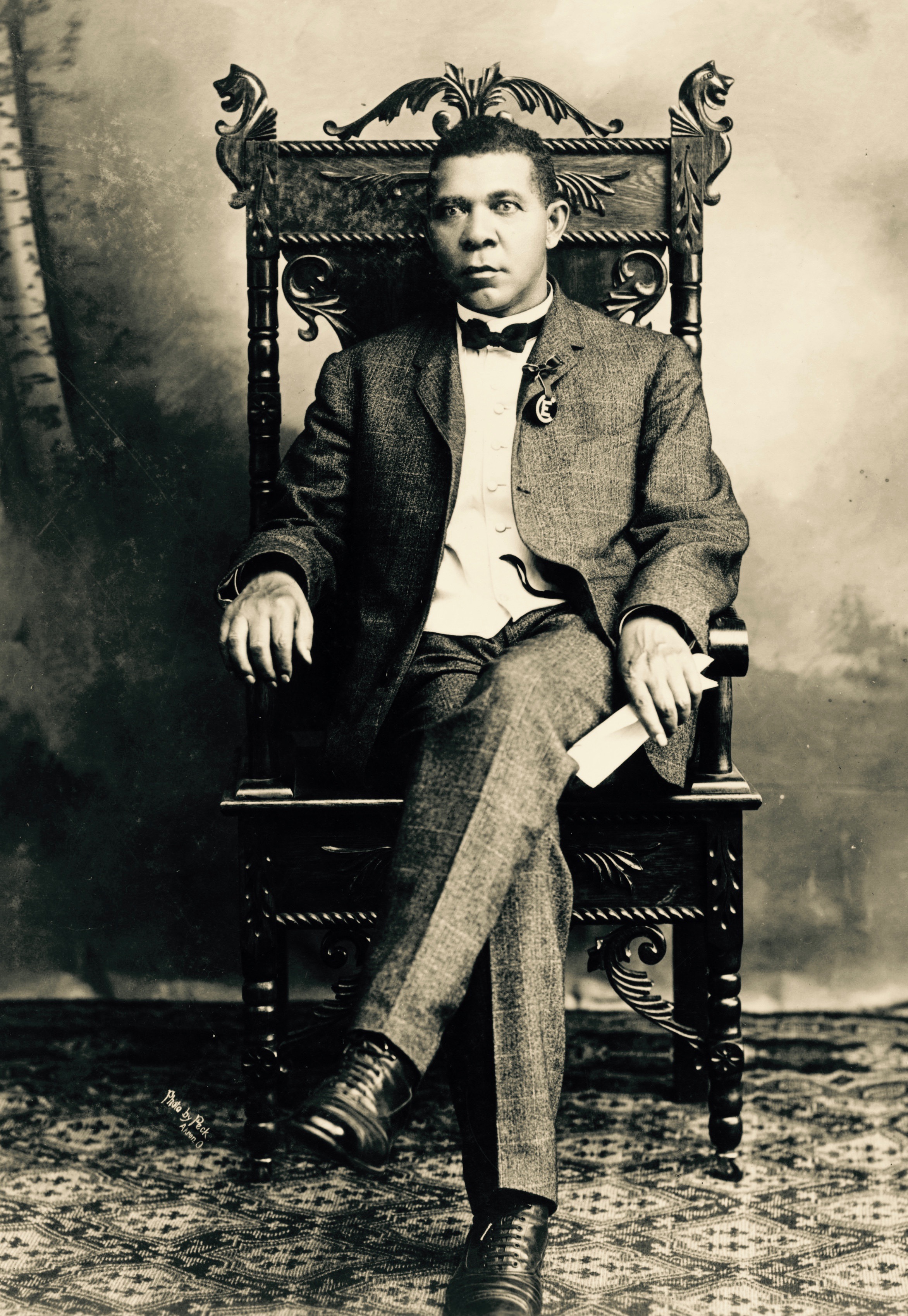
circa 1890: American educationalist, writer and champion of rights for blacks, Booker T Washington (1856 – 1915). (Photo by MPI/Getty Images)
Working in the Mines
Living conditions in their new home, located in a crowded and dirty neighborhood, were no better than those back at the plantation. Within days of their arrival, Booker and John were sent to work alongside their stepfather packing salt into barrels. Nine-year-old Booker despised the work, but found one benefit of the job: he learned to recognize his numbers by taking note of those written on the sides of the salt barrels.
Like many former slaves during the post-Civil War era, Booker longed to learn how to read and write. He was thrilled when his mother gave him a spelling book and soon taught himself the alphabet. When a black school opened in a nearby community, Booker begged to go, but his stepfather refused, insisting that the family needed the money he brought in from the salt packing. Booker eventually found a way to attend school at night.
When Booker was ten years old, his stepfather took him out of school and sent him to work in the nearby coal mines. Booker had been working there for nearly two years when an opportunity came along that would change his life for the better.
From Miner to Student
In 1868, 12-year-old Booker T. Washington found a job as a houseboy in the home of the wealthiest couple in Malden, General Lewis Ruffner and his wife Viola. Mrs. Ruffner was known for her high standards and strict manner. Washington, responsible for cleaning the house and other chores, worked hard to please his new employer. Mrs. Ruffner, a former teacher, recognized in Washington a sense of purpose and a commitment to improving himself. She allowed him to attend school for an hour a day.
Determined to continue his education, 16-year-old Washington left the Ruffner household in 1872 to attend Hampton Institute, a school for blacks in Virginia. After a journey of over 300 miles — traveled by train, stagecoach, and on foot — Washington arrived at Hampton Institute in October 1872.
Miss Mackie, the principal at Hampton, was not entirely convinced that the young country boy deserved a place at her school. She asked Washington to clean and sweep a recitation room for her; he did the job so thoroughly that Miss Mackie pronounced him fit for admission. In his memoir Up From Slavery, Washington later referred to that experience as his “college examination.”
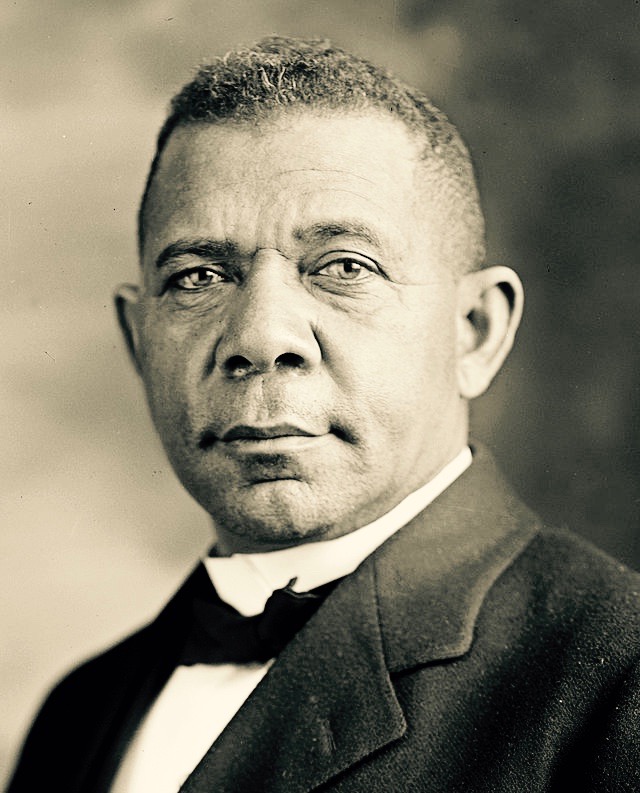 Hampton Institute
Hampton Institute
In order to pay his room and board, Washington worked as janitor at Hampton Institute, a position he held for his entire three years there. Rising early in the morning to build the fires in the school rooms, Washington also stayed up late every night to complete his chores and to work on his studies.
Washington greatly admired the headmaster at Hampton, General Samuel C. Armstrong, and considered him his mentor and role model. Armstrong, a veteran of the Civil War, ran the institute like a military academy, conducting daily drills and inspections.
Although academic studies were offered at Hampton, Armstrong also placed a lot of emphasis on teaching trades that would prepare students to become useful members of society. Washington embraced all that Hampton Institute offered him, but felt drawn to a teaching career rather than to a trade. He worked on his oratory skills, becoming a valued member of the school’s debate society.
At his 1875 commencement, Washington was among those called upon to speak before the audience. A reporter from the New York Times was present at the commencement and praised the speech given by 19-year-old Washington in his column the following day.
First Teaching Job
Booker T. Washington returned to Malden after his graduation, his newly-acquired teaching certificate in hand. He was hired to teach at the school in Tinkersville, the same school he had himself attended prior to Hampton Institute. By 1876, Washington was teaching hundreds of students — children during the day and adults at night.
During his early years of teaching, Washington developed a philosophy toward the advancement of blacks. He believed in achieving betterment of his race by strengthening the character of his students and teaching them a useful trade or occupation. By doing so, Washington believed, blacks would be assimilated more easily into white society, proving themselves an essential part of that society.
After three years of teaching, Washington appears to have gone through a period of uncertainty in his early twenties. He abruptly and inexplicably quit his post at Hampton, enrolling in a Baptist theological school in Washington, D.C. Washington quit after only six months and rarely ever mentioned this period of his life.
Tuskegee Institute
In February 1879, Washington was invited by General Armstrong to give the spring commencement speech at Hampton Institute that year. His speech was so impressive and so well-received that Armstrong offered him a teaching position at his alma mater. Washington began teaching his popular night classes in the fall of 1879. Within months of his arrival at Hampton, night enrollment tripled.
In May 1881, a new opportunity came to Booker T. Washington through General Armstrong. When asked by a group of educational commissioners from Tuskegee, Alabama for the name of a qualified white man to run their new school for blacks, the general instead suggested Washington for the job.
At only 25 years old, Booker T. Washington, a former slave, became the principal of what would become Tuskegee Normal and Industrial Institute. When he arrived in Tuskegee in June 1881, however, Washington was surprised to find that the school had not yet been built. State funding was earmarked only for teachers’ salaries, not for supplies or the building of the facility.
Washington quickly found a suitable plot of farmland for his school and raised enough money for a down payment. Until he could secure the deed to that land, he held classes in an old shack adjacent to a black Methodist church. The first classes began an astonishing ten days after Washington’s arrival in Tuskegee. Gradually, once the farm was paid for, the students enrolling at the school helped to repair the buildings, clear the land, and plant vegetable gardens. Washington received books and supplies donated by his friends at Hampton.
As word spread of the great strides made by Washington at Tuskegee, donations began to come in, mainly from people in the North who supported the education of freed slaves. Washington went on a fund-raising tour throughout the Northern states, speaking to church groups and other organizations. By May 1882, he had collected enough money to construct a large new building on the Tuskegee campus. (During the school’s first 20 years, 40 new buildings would be constructed on campus, most of them by student labor.)
Marriage, Fatherhood, and Loss
In August of 1882, Washington married Fanny Smith, a young woman who had years earlier been one of his pupils at Tinkersville, and who had just graduated from Hampton. Washington had been courting Fanny at Hampton when he was called to Tuskegee to launch the school. As the school’s enrollment grew, Washington hired several teachers from Hampton; among them was Fanny Smith.
A great asset to her husband, Fanny became very successful at raising money for Tuskegee Institute and arranged many dinners and benefits. In 1883, Fanny gave birth to daughter Portia, named after a character in a Shakespeare play. Sadly, Washington’s wife died the following year of unknown causes, leaving him a widower at only 28 years old.
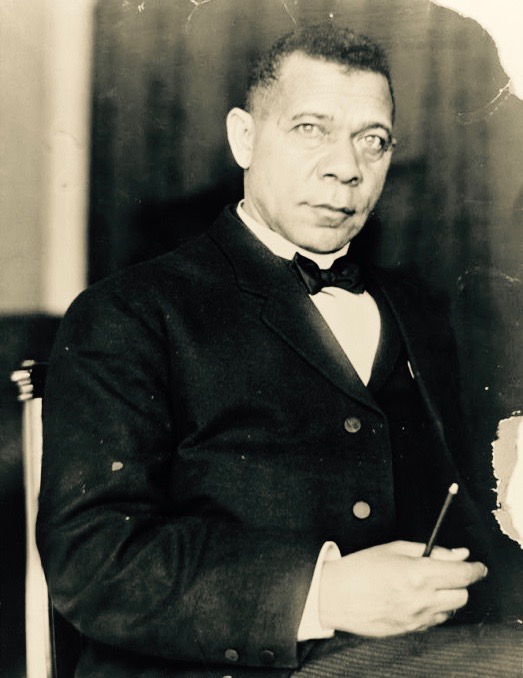 The Growth of Tuskegee Institute
The Growth of Tuskegee Institute
As Tuskegee Institute continued to grow both in enrollment and in reputation, Washington nonetheless found himself in the constant struggle of trying to raise money to keep the school afloat. Gradually, however, the school gained statewide recognition and became a source of pride for Alabamans, leading the Alabama legislature to allocate more funds toward the salaries of instructors.
The school also received grants from philanthropic foundations that supported education for blacks. Once Washington had sufficient funding to expand the campus, he was also able to add more classes and instructors.
Tuskegee Institute offered academic courses, but placed the greatest emphasis on industrial education, focusing on practical skills that would be valued in the southern economy, such as farming, carpentry, blacksmithing, and building construction. Young women were taught housekeeping, sewing, and mattress-making. Read more go to link below…

